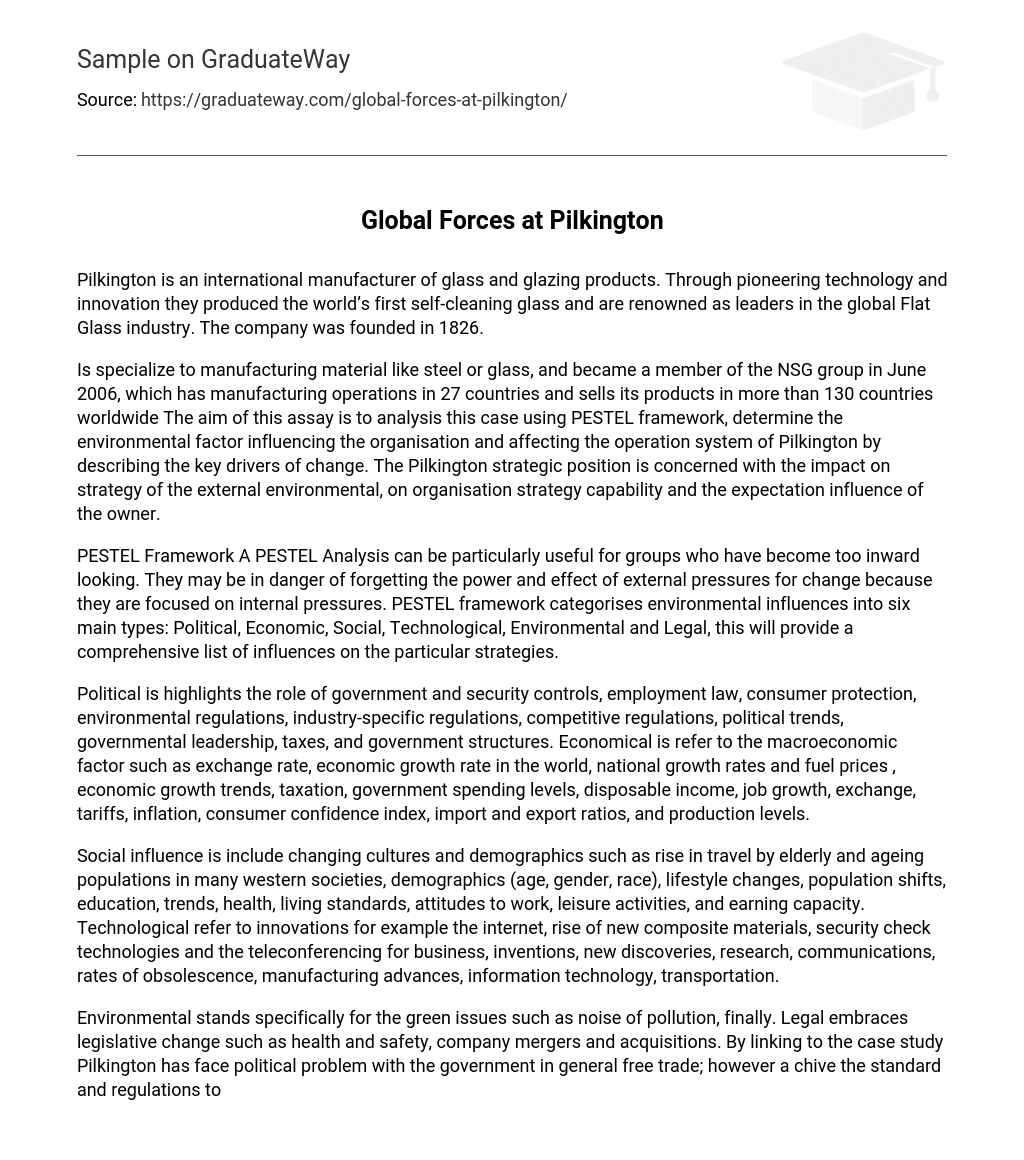Pilkington, a global leader in glass and glazing products, has been established since 1826. Known for their pioneering technology and innovation, they were the first to develop self-cleaning glass. The company holds a high reputation within the international Flat Glass industry.
Specializing in manufacturing materials such as steel or glass, Pilkington joined the NSG group in June 2006. The NSG group operates manufacturing facilities in 27 countries and markets its products across more than 130 countries globally. The objective of this analysis is to utilize the PESTEL framework for assessing the environmental factors that impact Pilkington and its operational system. This entails outlining the main catalysts of change. Pilkington’s strategic position takes into account the influence of external factors on strategy, the organization’s strategic capability, and owner expectations.
The PESTEL Framework is a valuable tool for organizations that have become too internally focused and may overlook the impact of external factors on their operations. The framework categorizes environmental influences into six main types: Political, Economic, Social, Technological, Environmental, and Legal. This comprehensive list of influences helps inform strategic decision-making.
Political factors involve the role of the government and security controls, employment law, consumer protection, environmental regulations, industry-specific regulations, competitive regulations, political trends, governmental leadership, taxes, and government structures. On the other hand, economic factors pertain to macroeconomic aspects including exchange rates, economic growth rates in the world and at national levels, fuel prices, trends in economic growth, taxation, government spending levels, disposable income, job growth, exchange rates, tariffs, inflation, consumer confidence index, import and export ratios, and production levels.
Social influence encompasses various factors such as the alteration of cultures and demographics. This includes the increase in elderly travel and the aging populations observed in numerous western societies. In addition, it incorporates demographics such as age, gender, and race, as well as lifestyle changes, shifts in population, education, trends, health, living standards, attitudes towards work, leisure activities, and earning capacity. Technological influence comprises advancements such as the internet, the emergence of new composite materials, security check technologies, teleconferencing for business purposes, inventions, novel discoveries, research initiatives, communication methods, rates of obsolescence, manufacturing advancements, information technology, and transportation systems.
Environmental issues refer to concerns such as pollution and noise. On the other hand, legal matters encompass legislative changes like health and safety regulations, as well as company mergers and acquisitions. Pilkington faced political challenges when it came to government policies on free trade. However, they managed to comply with the standards and regulations for building insulation while also attracting government investment. Climate changes and building design have presented significant problems for Pilkington in terms of the environmental factor and the industry as a whole.
Pilkington has developed a solid growth strategy for expanding its market share in the glass manufacturing industry through company acquisitions. This approach can effectively enhance the company’s productivity and profitability. The key drivers of change in business include economic, political, and social factors. Therefore, some organizations may stagnate while others thrive within this dynamic environment.
However, some factors driving organizations to change include competitive pressures resulting from globalization, the growth of consumer power, and the technological revolution. Globalization also creates threats and opportunities for businesses.
Market globalization: The globalization of markets means that businesses can expand and access customers internationally. In the case study, Pilkington faces challenges related to market globalization. They should standardize their products and identify global suppliers. Considering the climate, Pilkington should produce weather-resistant float glass for global use.
Cost globalization: Cost globalization enables trade and competition between economies, leading to lower prices, increased efficiency, productivity, and economic growth. However, it also requires increased levels of investment in the country.
By referencing the Pilkington case study, it becomes evident that shipping glass over long distances can incur significant costs. However, Pilkington must allocate more funds from their budget to accomplish this task, which will ultimately result in an increase in their product’s price. In the context of cost globalization, Pilkington should strive to produce goods at a low cost while maintaining superior quality compared to their competitors.
*Government policies: Government policies refer to principles or rules implemented to guide decision-making and achieve desired outcomes. The term “government policy” encompasses any action plan aimed at effecting change in a specific situation.
The text mentions that policies can be made that have the ability to impact various aspects including taxation, parking fines, and immigration laws. The case study of Pilkington highlights their participation in free trade to meet the demand for glass, while abiding by government regulations on taxation and seeking governmental support for their investment. Additionally, the text emphasizes the concept of increasing global competition, which refers to the worldwide market and the competition among companies to outperform one another.
Global competition benefits consumers by driving companies to continually strive to please them. The case study shows a decrease in glass manufacturing companies, which allows Pilkington to expand its market share through acquisitions. However, the increase in global competition will lead to more challenges for companies as they work to produce quality products and services that surpass customer expectations.





